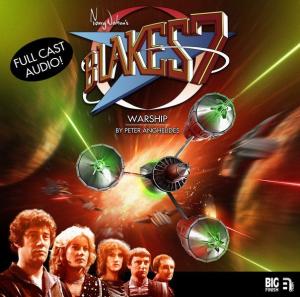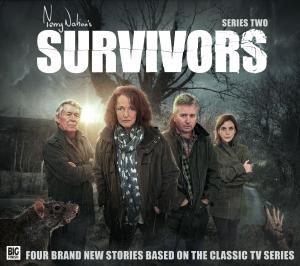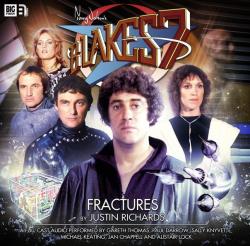Reviewed by Damian Christie
 Written by Peter Anghelides
Written by Peter Anghelides
Directed by Ken Bentley
Big Finish Productions
Released: January 2013
Given that over the past 15 years, Big Finish Productions has acquired the rights to do audio spin-offs of a variety of cult SF and fantasy TV programmes –
Doctor Who,
The Tomorrow People,
Robin Hood,
Dark Shadows,
Highlander, even
Stargate SG-1 and
Stargate: Atlantis – it is a little surprising that it is only in the last year that the company has (finally) acquired the rights to
Blake's 7.
Even then, the new adventures of Blake's crew have been largely limited to the first two volumes of
The Liberator Chronicles, with some members of the original cast –
Gareth Thomas (Blake),
Paul Darrow (Avon),
Michael Keating (Vila),
Jan Chappell (Cally) and
Jacqueline Pearce (Servalan) – performing two-hander narratives, either with each other or with another guest actor playing a completely new part. If long-suffering, diehard fans of the original series have wanted full-cast dramas with the Liberator crew (and not simply stories told by one of the crew), then they've had to console themselves with BF's supplementary range of B7 novels (
The Forgotten and
Archangel, to date).
In January, all that changed with the release of
Warship, the first full-cast B7 audio released by Big Finish and the first story since the second series, in 1979, to feature members of the original cast (yes, if you want to be pedantic, there have been other full-cast audio iterations of B7 since the 1990s, produced by BBC Radio, Magic Bullet Productions and B7 Media respectively, but nonetheless, most of those productions could only muster some of the original cast or they recast the characters altogether).
All the aforementioned original actors return for
Warship, along with
Sally Knyvette reprising her role as feisty smuggler Jenna. Only sound guru
Alistair Lock is the "odd one out", ably doubling as the voices of the Liberator's flight computer Zen and the supercilious computer Orac (parts originally played in the TV series by the late
Peter Tuddenham; long-time fans of other B7 audio productions, though, will be aware that Lock also played Zen in the short-lived B7 Media audio revival a few years ago).
Warship is by far the best B7 audio that Big Finish has produced so far. As first-rate and as innovative as Big Finish is at doing two-hander plays, there is no substitute for a full-cast drama. Fuelled by one's own listening imagination, the solid writing by self-professed B7 fan
Peter Anghelides, the zest of the original cast and Lock's sound design and incidental music (which recaptures the flavour of original composer
Dudley Simpson),
Warship is the closest thing we've had to a B7 TV episode in more than 30 years.
The "authenticity" of the story is further helped by its placement in the B7 canon. It neatly bridges the "gap", so to speak, between the second and third TV series. The second one ended on a cliffhanger, with the Liberator acting as the first line of defence against an extra-terrestrial invasion from outside Federation space. When the show resumed, the invasion had been repelled, the Federation had lost more than half of its forces in the war, and the Liberator crew was forced to temporarily abandon ship. Most importantly, the third series began with the loss of its titular character, with Blake going AWOL with little explanation (Thomas having departed the series) and Avon taking charge of the Liberator.
Warship goes part of the way to explaining what happened in the interim.
To his credit, Anghelides doesn't just provide a filler between seasons. While it is a logical sequel or companion to second series finale
Star One, he introduces enough new, fresh elements into the narrative to make it engaging and exciting while still keeping the writing tight.
Warship has all the hallmarks of a studiobound B7 episode (the major setpiece being the Liberator itself), with the action played out mainly between the core characters. Anghelides, though, doesn't shy away from giving the story a celestial, expansive feel and his climax is of such Hollywood blockbuster-style proportions that it would have been well beyond the scope of a TV episode. (Well, the climax could – and probably would - have been attempted on TV but the result would have been decidedly shaky on a 1970s budget! Then again, I suspect even that may be a knowing wink on Anghelides' part!)
However, what makes
Warship so successful is how much it feels like a B7 episode in its own right – and that would not have been possible without the inclusion of the original cast.
Blake's 7 was so successful on TV because of its strong characterisation and ultimately it is the characters that bring the story to life.
It is a delight to hear all of the principal actors back in their roles and playing off each other. Anghelides can write all the clever one-liners he wants – but if Darrow and Keating, for example, aren't there to execute the delivery, then the battle is half-lost. This is something that is most noticeable in Big Finish's B7 novels – the wordplay between the characters is so flat in places that you realise just how integral the original actors are to making the lines sound right. Similarly, when B7 Media relaunched B7 a few years ago for audio with the characters recast, it was obvious – painfully so! – just how much the original actors had made the parts their own (for example, in the revamped version, Avon was portrayed by
Colin Salmon, who did his best with that part but ultimately wasn't a patch on Darrow's acerbic wit).
The repartee between the characters in
Warship is worthy of the original series, whether it be exchanges between Blake and Avon, Avon and Vila, Vila and Jenna, or even Cally and Servalan. Anghelides' dialogue, delivered perfectly by the cast, recaptures the dynamic of the original Liberator crew on TV. Although their voices may have become more seasoned with age, Thomas, Darrow, and Keating re-create their roles effortlessly and in turn reprise their on-screen chemistry – the Blake/Avon rivalry and the Avon/Vila double act – as if three decades have not elapsed at all. Even Cally and Jenna, who by the end of the second series had reverted to "housewife status" on the Liberator, get to say some of the best lines and earn their own slices of the action. In
Warship, Knyvette and Chappell get the chance for redemption and take it with a vengeance (indeed, both actors discuss their relief at being given something positive to do in the supplementary documentary disc in this release). Although her part in the story is relatively minor, Pearce clearly relishes her lines as Servalan. Even in the face of mutually assured destruction, the listener is reminded of just how duplicitous and cunning Servalan was on TV. As mentioned earlier, Lock also does a creditable job as the ship's computers, recreating Orac's haughtiness - "Kindly do not interrupt while I am enumerating the possibilities!" – and Zen's bombastic, yet precise tones – "That information is not available."
Warship is a magnificent return to form for the Blake's 7 franchise; it has been well worth the wait after a couple of indifferent efforts on audio in a period spanning 17 years and some early workman-like efforts by Big Finish's
Liberator Chronicles. Although Big Finish's immediate plans are to do a few more volumes of
The Liberator Chronicles over the next 18 months, hopefully the positive reception that
Warship has received since its release will convince BF that full-cast B7 audio dramas are the way of the future. There is really no reason why BF cannot follow its successful
Doctor Who template of creating "event" box sets, such as the recent
Dark Eyes and
UNIT: Dominion. It's what the fans obviously want, but no doubt Cally's old Auron saying rings true here too: "Before you desire, you should deserve!" We'll obviously need to pledge our support with our purses first if we are to deserve at least one more full-cast narrative with the original B7 crew.









